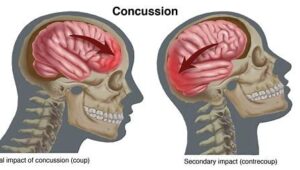
Concussions are a common injury, often caused by sports accidents, falls, or head trauma. If you suspect a concussion, knowing the symptoms and how to respond is vital. You may even wonder, “Do I have a concussion?” or consider taking a concussion quiz to assess your condition. In this article, we’ll explore concussion basics, symptoms, recovery tips, and how NCX Brain Recovery can help with long-term healing.
A concussion is a mild traumatic brain injury (mTBI) caused by a jolt, blow, or impact to the head. This sudden movement can cause the brain to collide with the skull, leading to chemical changes or even damage to brain cells.

As shown in the illustration, a concussion often results in both a primary and secondary impact. When the head is struck, the brain first hits the point of contact (coup), but due to the force, it then rebounds and collides with the opposite side of the skull (contrecoup). This back-and-forth motion increases the potential for brain damage, as it can affect multiple regions of the brain, leading to a broader range of symptoms.
If you’re asking, “Do I have a concussion?” or searching for a quick 1-minute concussion test, here are some common symptoms to look for:
Key points to understand about concussions:

A quick online concussion quiz or 1-minute concussion test can help you determine if you might need medical attention. Remember, these tools are not a replacement for professional diagnosis but can guide your next steps.
The good news is that your symptoms could resolve without significant therapy or intervention. On average, 80-90% of concussion symptoms resolve within a few weeks following an injury, especially if you follow our recommended concussion protocols.
If you suspect you have a concussion, in the first few days follow these steps:

Persistent Symptoms: What is Post-Concussion Syndrome?
In some cases, concussion symptoms persist longer than expected. This condition is known as post-concussion syndrome (PCS). In many cases, post-concussion syndrome is caused by healthy parts of the brain compensating for damaged parts of the brain and overloading it’s capacity. This is why even simple tasks can sometimes overwhelm individuals with PCS and exacerbate lingering concussion symptoms.
At NCX Brain Recovery, we’ve developed a cutting-edge approach to manage lingering concussion symptoms:
Schedule a Free Consultation:
If you’re struggling with ongoing concussion symptoms, don’t hesitate to reach out. Our team of experts is here to help guide you through your recovery journey. Schedule your free consultation today to learn how our specialized program can assist in your healing process.
Conclusion
Concussions are complex injuries, and their management should never be taken lightly. If you or a loved one experiences a concussion, remember to seek immediate medical attention and follow a comprehensive recovery plan. To help in your recovery plan, we offer free consultations with one of our licensed therapists at our concussion clinic in Springville, Utah. Click below to book your free consultation in person or online.
Faqs
While most people recover from a concussion within 2-4 weeks, recovery time can vary. Some individuals may experience symptoms for several months.
You can take a concussion quiz or a free online concussion test for initial guidance.
It’s generally recommended to limit screen time, especially in the early stages of recovery, as it can exacerbate symptoms. Gradually reintroduce screen use as symptoms improve.
NCX uses an intensive, multi-sensory approach that challenges the brain from multiple angles simultaneously. This differs from traditional methods that often focus only on one therapy at a time, typically once a week. Research has shown that for maximum successful recovery, a multi-sensory approach is most effective. Our intensive program delivers over 30 hours of therapy per week, allowing for faster and more comprehensive healing.
Return to activities should be gradual and guided by your symptoms. Always consult with a healthcare professional before returning to sports or other high-risk activities.
Concussion can affect the eyes in several ways, including:
While concussions can occur in any sport, some high-risk sports include football, hockey, soccer, and basketball. However, it’s important to note that concussions can happen in any activity, not just sports.
After working for over 7 years with Cognitive FX in Provo, Utah, developing multisensory integration therapy, and over 20 years at Alpine school district, Nate set out to bring more relief to those struggling with concussions and traumatic brain injuries. Working with countless families and individuals, Nate has seen first hand how debilitating post-concussion syndrome can be, so he built a team that could bring more hope and healing to Utah. With NCX Brain Recovery Center, his vision has come true.

We collect cookies on our site to enhance user experience and improve the quality of our site. We do not have third-party ads on our site, and will never sell your information.